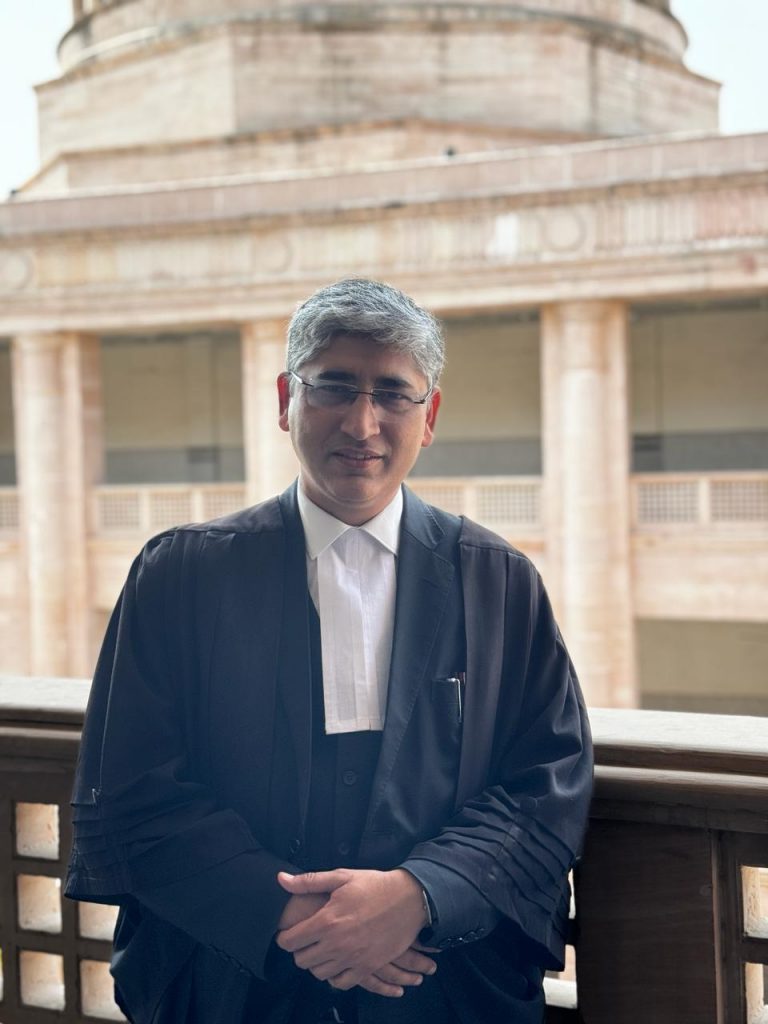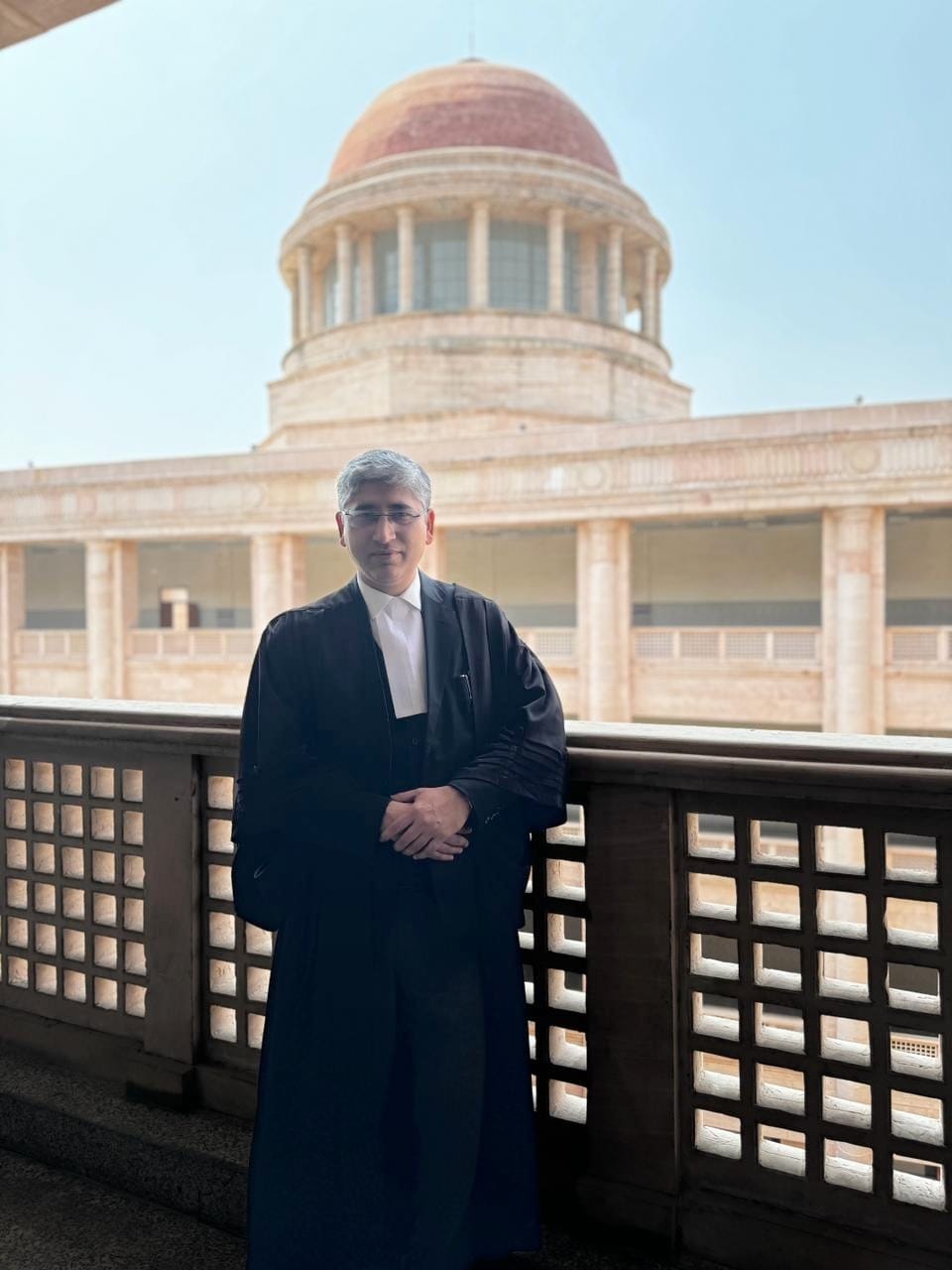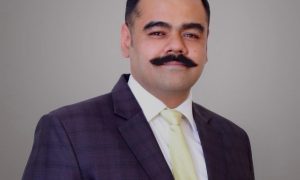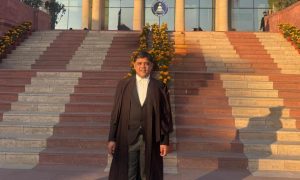This interview has been published by Namrata Singh and The SuperLawyer Team

Can you take us through the journey of your career, from your early days as a law student to becoming a Partner at Amicus Demos? What were some of the challenges you faced along the way, especially in the initial stages of your career?
I pursued my B.A. LL.B. (Hons) at the Faculty of Law, Lucknow University, from 1998 to 2003. Throughout my five years in law school, I actively participated in court proceedings as an intern, keenly observing the accomplished lawyers and stalwarts of the Oudh Bar Association, presenting cases before various courts. Post-graduation, I started my legal practice on the criminal side, appearing before the High Court at Lucknow and handling matters in Magistrate Courts and Sessions Court. Despite facing the common challenge of limited briefs at the beginning of my career, I recognized the importance of patience. Early on, the pressure to succeed was intense, but I firmly believed in focusing on developing the necessary skills for effective courtroom advocacy, rather than solely chasing briefs and financial gains, I prioritized honing my talents and improving the quality of my work. It was a challenge to decline cases where a case was not made out, but this approach paid off over time. With time my skills grew, so did the quantity of work, leading to a subsequent increase in remuneration.
You’ve had extensive experience practicing in the criminal side of law. What drew you to this field initially, and how has your perspective evolved over the years?
I had the privilege of growing up in a family of legal luminaries. My grandfather, Late Justice Murtaza Hussain, embarked on his legal journey in 1944, ascending from Munsif to the esteemed position of District Judge by 1968. His illustrious career continued with elevation as a Judge of the Allahabad High Court, Lucknow, in 1976. Thereafter, he also served twice as the Lokayukta of Uttar Pradesh from 1983 to 1989. My father, Late Jawed Murtaza, thrived in a flourishing civil practice in Lucknow. Meanwhile, my uncle, Justice Imtiaz Murtaza, made a mark as a prominent lawyer in the criminal side. His trajectory led him to become a Judge of the Allahabad High Court in 2001, culminating in his retirement as the senior most judge in 2015.
During my college days, I regularly interned at my uncle’s office, immersing myself in the dynamic realm of criminal law. His bustling chamber provided ample opportunities to engage with criminal cases, interact with clients, and witness the intricate interplay of legal provisions such as the Indian Penal Code, CrPC, and Evidence Act. This experience ignited my passion for criminal law, shaping my perspective and fostering a profound interest in the complexities of legal practice.
As a partner at Amicus Demos, what do you find most rewarding about your role? Are there any particular aspects of your work that you find especially fulfilling or challenging?
Mr. Gaurav Mehrotra is the senior/managing partner at Amicus Demos. Mr. Gaurav Mehrotra specializes in civil, constitutional, and commercial matters, while I exclusively handle criminal cases within the firm. Our professional collaboration is deeply rewarding, and the law firm feels like an extended family. Dealing with criminal matters presents a unique challenge due to its direct impact on an individual’s life and personal liberty. The stakes are inherently higher, often involving questions of life and death. As a defence lawyer, our focus extends beyond client representation; we strive to protect the rights of the accused and assist the court in uncovering the truth. One particularly challenging role for me was serving as a Special Public Prosecutor in a case involving high-profile officials and public representatives. This role demanded a distinct preparation and approach compared to our usual stance as defence counsel.
Given your experience as a panel arbitrator for stock exchanges, could you highlight some key differences between arbitration proceedings and traditional courtroom litigation?
There are some inherent advantages in arbitration proceedings. These proceedings are more expeditious and can be conducted in a manner to suit the better need of the parties.
Arbitration proceedings differ from courtroom exchanges in several key aspects. Arbitration offers a private setting, allowing for confidentiality, and enables parties to choose arbitrators for a neutral stance.
However, there is limitation to arbitration proceedings as the same are limited to inter se parties to an agreement or contract whereas traditional trial or courtroom proceedings are more accessible and cater to the needs of the public at large. The nature and result in an arbitration is only limited to either monetary claims or breach of a contractual obligation and therefore the proceedings are limited to that extent.
As an arbitrator on the panel for stock exchanges, my role involves resolving disputes between market participants in a fair and impartial manner. I assess evidence, review financial regulations, and consider market practices to make informed decisions. It’s crucial to maintain transparency and uphold the integrity of the stock exchange. The dynamic nature of the financial markets requires adaptability and a deep understanding of the industry. Serving on the panel has provided me with valuable insights into the intricacies of trading and the importance of fostering trust within the financial community.
The process is generally less formal, faster, and more cost-effective than courtroom proceedings. Arbitrators often possess industry-specific expertise. Decisions are binding with limited rights to appeal, contributing to a quicker and more final resolution compared to the traditional system.
You’ve represented some prestigious corporations. What are some common legal challenges these corporations face, and how do you approach addressing them?
Representing corporations in criminal matters presents unique challenges. One major issue is balancing legal obligations with the corporation’s reputation. Managing public relations during a criminal investigation is delicate, as negative perceptions can harm the company’s brand. Additionally, coordinating communication among various internal departments and legal teams can be challenging. Maintaining attorney-client privilege while interacting with corporate employees adds to the complexity. Lastly, corporations often face potential financial repercussions, including fines and regulatory sanctions, making strategic legal counsel crucial to navigate these challenges effectively.
Corporations often face problems due to local law and order situations as well. One such example is that a kisan (farmers’) union once lodged an FIR against a sugar mill and its officials alleging manipulation in quantity of sugarcane purchased. Often, criminal proceedings are sometimes instituted to settle civil and consumer disputes. A fitting example of such abuse is that once a criminal complaint was filed against a leading direct-to-home (DTH) television company and its directors by a consumer for some issue with respect to discontinuation of service. The proceedings were finally stayed by the High Court exercising powers under Section 482 CrPC.
As someone who has actively appeared before the Supreme Court of India, can you share any insights or experiences from handling cases at such a prestigious level?
Handling cases before the Supreme Court is a demanding yet rewarding experience. The process involves intricate knowledge of Constitutional and legal principles. The Court deals with matters of national importance and the stakes are quite high. At times, though we represent a specific client, the question of law involved in the matter affects the public at large and has pan India ramifications.
In one of my matters one old and ailing accused who had suffered brain stroke was denied bail by Sessions Court and was sent to custody, at that time there was a Rule in Allahabad High Court to give 10 days advance notice to State before filing bail, we filed SLP before Supreme Court directly challenging the order of sessions court and the Court was apprised about the prevailing rule, Supreme Court not only granted bail to accused but also issued notice to High Court, the same led to amendment of Rules and notice period in bail matters was reduced from 10 days to 2 days in the Allahabad High Court, which hugely benefited the public at large. Similarly, I also appeared in the proceedings before the Supreme Court in the Satender Kumar Antil matter and apprised the Court regarding the laxity in implementation of the guidelines and directions issued by the Court in the State of U.P. In one of the IAs, the Court took stern view of the practice prevalent in Uttar Pradesh where the Magistrate or the Sessions Court would simply deny the grant of anticipatory bail holding that there was no apprehension of arrest since the offences entailed less than seven years of imprisonment and was thus covered by the direction issued in Satendra Kumar Antil case. The Supreme Court strongly deprecated such a practice and since then, there has been a paradigm shift in the matters regarding grant of bail and anticipatory bail in the State of U.P. in consonance with the law laid down by the Supreme Court.
In your experience, what would you say is the most difficult or challenging aspect of handling criminal cases, and how do you navigate through those challenges to ensure the best possible outcome for your clients?
As a criminal law attorney, one of the most challenging aspects is navigating the emotional and personal nature of criminal cases. One of the challenges I feel is informing the client about an adverse order. As these matters relate to the life and liberty of the individual, it is emotionally challenging to inform them that the outcome was not favourable. Balancing legal representation with the human aspect of the client’s predicament requires empathy and a nuanced approach. Engaging with clients who may be facing serious consequences, emotionally charged situations, or societal stigma demands effective communication and understanding. The challenge lies in managing expectations while ensuring a robust legal defence. As a matter of principle, I always give my honest advice and opinion and inform them about the likely outcome of the case without giving them any false hope. I always advise my clients to cooperate with the investigation and trial and never abscond from the judicial process. The adversarial nature of criminal proceedings and the burden of proving innocence can be daunting. To overcome these challenges, maintaining open communication with clients and managing expectations realistically are some crucial aspects necessary in criminal law practice. Crafting a thorough defence strategy, staying abreast of legal precedents, and adapting strategies to suit the unique circumstances of each case are key elements in securing the best possible outcome for clients in the complex realm of criminal law.
Outside of the courtroom, what are some of your personal interests or hobbies that help you unwind and recharge?
Outside of the courtroom, I find solace in indulging my passion for poetry. Exploring the intricate beauty of language and the emotional depth of poetic expressions serves as a creative outlet. Traveling is another cherished pursuit, providing a break from the legal intricacies and allowing me to explore diverse cultures and landscapes. Spending quality time with my family is paramount; their support is my anchor amidst the challenges of court. These not only help me unwind and recharge but also contribute to a well-rounded perspective that enhances my legal practice.
Looking back at your journey from being enrolled as an Advocate to becoming a Partner, what advice would you give to young lawyers aspiring to build a successful career in law?
Reflecting on my journey so far, my advice for aspiring young lawyers is to embrace continuous learning, nurture a robust professional network, and cultivate a strong work ethic. Sharpen your communication skills, consider specializing in a specific legal niche, and stay adaptable to changes in the legal landscape. Uphold the highest ethical standards, persist through challenges, and strive for a healthy work-life balance. Community involvement and pro bono work not only contribute to society but can also enhance your professional reputation. Remember, success in litigation is a journey that demands dedication, patience, perseverance, and a genuine passion for the field.
Get in touch with Nadeem Murtaza-


























